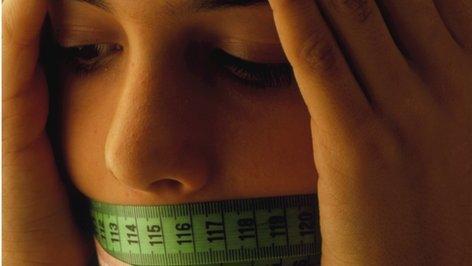'Weight terror' common in 13-year-old girls, study says
- Published

About 10% of 13-year-old girls are "terrified" about putting on weight, the first UK study looking for warning signs of eating disorders suggests.
Doctors said they were "worried" by the high degree of weight fixation found in 13-year-old girls, years before eating disorders typically start.
Researchers say it might be possible to stop full eating disorders developing.
Their findings, in the Journal of Adolescent Health, came from interviews with the parents of 7,082 13-year-olds.
Eating disorders, such as anorexia, tend to start in the mid-teenage years, although they can begin before then.
The study, by University College London and the London School of Hygiene and Tropical Medicine, looked at the years before those disorders tend to start.
Interviews with the parents of 7,082 13-year-old schoolchildren showed:
Nearly 12% of girls and 5% of boys were "terrified" by the thought of getting fat
52% of girls and a third of boys said they were "a little worried" about getting fat
One in three girls and one in five boys were "distressed" by their body shape
26% of girls and 15% of boys had "eating disorder behaviours" such as fasting
Some habits, such as uncontrolled bingeing, were linked to higher weight two years later
One of the researchers, Dr Nadia Micali, told the BBC she was surprised children were so concerned about weight at such a young age.
"For me the results were particularly worrying, I wouldn't have thought they'd be so common at this age.
Why body image is such a concern to teenagers
"Part of me thinks it's a shame we didn't ask earlier, we don't know when this behaviour starts.
"Quite a large proportion will develop full-blown eating disorders, maybe more than half."
However, she said there might be an opportunity to help children before they develop an eating disorder if a reliable set of warning signs could be developed for parents and teachers.
In a statement the eating disorder charity Beat said it was an interesting and important study.
"This is the first time a study like this has been carried out so we have nothing to compare it to and therefore don't know if the problem is increasing or getting worse.
"However it is striking and worrying how many young people had concerns about their weight from such a young age.
"It does not mean that they will all go on to develop eating disorders, but they could be tempted by unhealthy ways to control their weight and shape."
The findings came through data collected from the Children of the 90s study, external.
Bullying
A separate analysis of those children, by a team at the University of Warwick, suggested bullying was linked to an increased risk of psychotic experiences, such as hearing voices, and paranoia.
Lead researcher Prof Dieter Wolke said: "We want to eradicate the myth that bullying at a young age could be viewed as a harmless rite of passage that everyone goes through - it casts a long shadow over a person's life and can have serious consequences for mental health.
"It strengthens on the evidence base that reducing bullying in childhood could substantially reduce mental health problems.
"The benefit to society would be huge, but of course, the greatest benefit would be to the individual."
- Published11 October 2012

- Published7 October 2013

- Published22 October 2013

- Published7 October 2013
